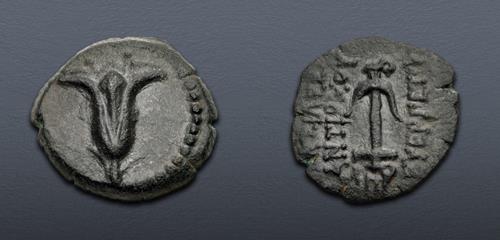
|
JUDAEA, Hasmoneans. John Hyrkanos I (Yehohanan). 135-104 BCE. Æ Prutah (15.5mm, 2.28 g, 1h). In the name of Seleukid king Antiochos VII Euergetes (Sidetes). Jerusalem mint. Dated SE 181 (132/1 BCE).
Triton XXV
Lot: 369. Estimated: $ 500
Greek, Bronze, Coin-in-Hand Video
Sold For $ 1 300. This amount does not include the buyer’s fee.
Go to Live
|
|
JUDAEA, Hasmoneans. John Hyrkanos I (Yehohanan). 135-104 BCE. Æ Prutah (15.5mm, 2.28 g, 1h). In the name of Seleukid king Antiochos VII Euergetes (Sidetes). Jerusalem mint. Dated SE 181 (132/1 BCE). Lily / [B]AΣIΛEΩ[Σ] ANTIOXOY EYEPΓETOY, upright anchor; AΠP (date) below. Meshorer p. 30; Hendin 6165; SC 2123; HGC 9, 1103; DCA 209; Bromberg –; Shoshana –; Sofaer 1; Spaer –. Dark green-brown surfaces. Near EF. Exceptional for issue.
From the Father & Son Collection. Ex Gemini IX (8 January 2012), lot 172.
Rising to power in the shadow of the withering Seleukid Empire, the Hasmonean dynasty began roughly twenty years after the Revolt of the Maccabees. Led by Mattathias the Hasmonean, an elder faith leader from the village of Modiin, and his five sons, the revolt spawned out of a furious rejection of Hellenistic values forcefully imposed on the Jewish ways of life by the Seleukids. Raising a small army in response to the Seleukid king, Antiochos IV Epiphanes, sending troops to oversee religious conversion in Modiin, Mattathias waged war against the empire. Eventually the movement was passed along to his son, the legendary Judah “The Maccabee” — his name possibly derived from the Aramaic maqqaba meaning “The Hammer”. A gifted general proficient in guerilla tactics, Judah defeated the Seleukid army of Apollonios, and liberated Jerusalem and its Temple in 164 BCE. His victory was met with such rejoicing that the Temple was rededicated for eight days in a grand festival that would endure each year through the millennia — the Jewish tradition of Chanukah. Fighting continued for several years, ultimately ending in a treaty between Judah and Lysias, the viceroy of Antiochus IV. As David Hendin writes, “Freedom of worship was once again guaranteed, and Jerusalem was recognized as the religious capital of the Jewish nation.”
Established by Judah’s brother, Simon Thassi, the Hasmonean dynasty lasted from roughly 140 BCE to 37 BCE, and during its prominence it facilitated the expansion and full independence of Judaea. Temporarily unhindered by military obligations, Simon’s Judaea was bustling and prosperous — even garnering the support of the Seleukid-hating Roman Senate in 139 BCE. Much of Hasmonean rule, otherwise, was marred by civil conflict. Judean-Seleukid struggle would also continue on and off for years until the Seleucids were finally relegated to obscurity by their own hand, torn asunder by civil war of their own. The dynasty would again be threatened with the rise of Pompey the Great in Rome, who would eventually lead the Roman Republic to conquer Judaea in 63 BCE, turning the province into a tributary state.
The coinage produced during this time was some of the most important in the history of Judaea, as the first Jewish dynastic coinage ever struck. The lily, the ancient symbol of Jerusalem and of rebirth, supplanted on early coinage the traditional position of the Seleukid king on the obverse, marking Jewish religious independence.
The final winners of all Triton XXV lots will be determined at the live public sale that will be held on 11-12 January 2022. Triton XXV – Session Two – Greek Coinage (Part 2) through Roman Provincial Coinage will be held Tuesday afternoon, 11 January 2022 beginning at 2:00 PM ET.
Winning bids are subject to a 20% buyer's fee for bids placed on this website and 22.50% for all others.
We recognize that our users may have various Internet Browsers and Operating Systems. We like our visitors to have the best possible experience when using our bidding platform. However, we do recognize that it is impossible to develop applications that work identically, efficiently and effectively on all web browsers. The CNG bidding platform supports the latest stable major version and the stable previous version of Mozilla Firefox and Chrome.
|
